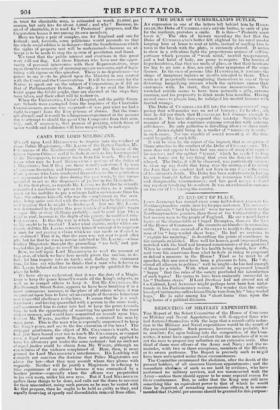THE DUKE OF CUMBERLAND'S BUTLER. AN expression in one of
the letters left behind him by Him,- FELDT, the Duke of CUMBERLAND'S suicide butler, in spite of pity for the madman, provokes a smile. It is this—" Posterity must know it." The idea of history recording the fact that the Duke of CUMBERLAND'S butler felt slighted by his royal master keeping him at home to wait at table, instead of sending him to town in the break with the plate, is curiously absurd. It serves to show in a ridiculous light the preposterous notions of self-im- portance which persons of "weak mind," morbid temperament, and a bad habit of body, are prone to acquire. The fancies of hypochondriacs, that they are made of glass, or that their heads are too big to go into a door, are only other symptoms of the same disease. In the case of persons like IIAMPFELDT, it assumes the shape of imaginary injuries or insults intended to them. They seem as if perpetually contemplating themselves in one of tliese distorting magnifying mirrors which the opticians amuse their customers with. In short, they become monomaniacs. The wretched suicide seems to have been naturally a silly, nervous creature, and his propensity to drink made him maudlin. Having no real cares to plague him, he indulged his morbid humour with fancied wrongs.
The Duke of CUMBERLAND fell into the common error of sup- posing that self-murder was an act of bravery ; fer he obsu: .eel, that lie did not think that HA:MPFELDT had courage enough to commit it. We have often exposed this mistake. Suicide is the resource of him who combines extreme cowardice with extreme selfishness. Its only palliative is drivelling itlioney or sheer mad- ness. Juries rightly bring in a verdict of " tempo:c ry insanity " in such cases. No one capable of sound reasoning at the time could be guilty of such folly.
It will be seen by the report of the inquest, that no suspicion of blame attaches to the conduct of the Duke of Cum ilEnr.ANn. The num does not appear to have had any cause of comp'aint against his master; and the epithet " tyrant," which he appliA to him, is not borne out by any thing that even the decerse 1 himself alleged. The Duke, it will be observed, was particularly anxious to clear up any doubt that hung over the matter, ai,d to sat isfy the Jury that his conduct had not been in any de,,.,.r;c the (wise of his servant's death. The Duke has been unfortunate in havhig his name Lrouf,lit before the public in connexion with lorrible and disagreeable circumstances; and has good reason t, d,ea:l any mystery involving his conduct. It was an awkwatd occurrence on tile eve of his leaving the country.


















 Previous page
Previous page